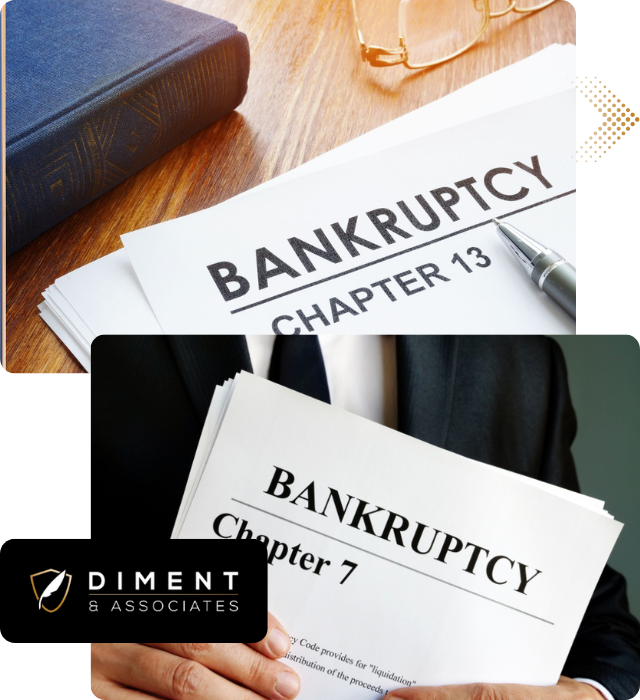Glossary
Glossary

Diment’s Bankruptcy Glossary
341 Meeting
A meeting of creditors at which the debtor is questioned under oath by creditors, a trustee, examiner, or the United States trustee about his/her financial affairs.
Adversary Proceeding
A lawsuit arising in or related to a bankruptcy case that is commenced by filing a complaint with the bankruptcy court.
Automatic Stay
An injunction that automatically stops lawsuits, foreclosures, garnishments, and all collection activity against the debtor the moment a bankruptcy petition is filed.
Chapter 7
A type of bankruptcy useable by consumers AND businesses and is the most common type of bankruptcy. Your debts are mostly wiped out and, while you can hold on to a few essential assets, the rest can be sold to pay off creditors.
Chapter 13
A procedure that allows an individual to keep all of their assets by reorganizing their debts into a payment plan, based upon how much they can afford to pay back over 3 to 5 years, and if all payments are made timely, the remainder of eligible debts will be discharged.
Creditor
A person or business to which an individual owes money to.
Debtor
The person or business (you) seeking protection from creditors under the bankruptcy laws.
Secured Creditor
Refers to the company or person that holds a lien against somebody’s property to ensure repayment of a secured debt.
Discharge
The satisfaction or elimination of the debts owed by the bankruptcy court.
Equity
The value of a debtor’s interest in property that remains after liens and other creditors’ interests are considered. (Example: If a house valued at $60,000 is subject to a $40,000 mortgage, there is $20,000 of equity.)
Exemptions
The laws that protect protect assets, not assets themselves.
Lien
An interest that the lender has against the property of someone else to secure repayment of a debt. (Example: a mortgage or car loan)
Liquidation
A sale of a debtor’s property with the proceeds to be used for the benefit of creditors.
Secured Debt
Any debt that is backed by a mortgage, pledge of collateral or other lien. It is debt held by a secured creditor who has the right to pursue specific pledged property upon default.
Trustee
An agent of the court who manages the property of the debtor for the benefit of the creditors.
Unsecured Debt
A claim or debt for which a creditor holds no special assurance of payment; a debt for which credit was extended based solely upon the creditor’s assessment of the debtor’s future ability to pay.
Unsecured Creditor
A creditor who extended credit to a debtor without collateral security. If the debtor files for bankruptcy, the unsecured creditors are paid on a pro-rata basis only after the claims of all secured creditors are satisfied.
